- Home
- John le Carré
A Murder of Quality AND Call for the Dead Page 3
A Murder of Quality AND Call for the Dead Read online
Page 3
He had put down the letter on the small marquetry table beside him, and was looking at her owlishly.
“This other letter she sent you, Brim. Where is it?”
She handed him the folder. He opened it and after a moment read aloud Stella Rode’s other letter:
Dear Miss Fellowship,
I would like to submit the following suggestion for your “Kitchen Hints” competition.
Make your basic batch of cake mixture once a month. Cream equal quantities of fat and sugar and add one egg for every six ounces of the mixture. For puddings and cakes, add flour to the required quantity of basic mixture.
This will keep well for a month.
I enclose stamped addressed envelope.
Yours sincerely,
Stella Rode (née Glaston)
PS – Incidentally, you can prevent wire wool from rusting by keeping it in a jar of soapy water. Are we allowed two suggestions? If so, please can this be my second?
“She won the competition,” Miss Brimley observed, “but that’s not the point. This is what I want to tell you, George. She’s a Glaston, and the Glastons have been reading the Voice since it started. Stella’s grandfather was old Rufus Glaston, a Lancashire pottery king; he and John Landsbury’s father built chapels and tabernacles in practically every village in the Midlands. When Rufus died the Voice put out a memorial edition and old Landsbury himself wrote the obituary. Samuel Glaston took on his father’s business, but had to move south because of his health. He ended up near Bournemouth, a widower with one daughter, Stella. She’s the last of all that family. The whole lot are as down to earth as you could wish, Stella included, I should think. I don’t think any of them is likely to be suffering from delusions of persecution.”
Smiley was looking at her in astonishment.
“My dear Brim, I can’t possibly take that in. How on earth do you know all this?”
Miss Brimley smiled apologetically.
“The Glastons are easy—they’re almost part of the magazine. They send us Christmas cards, and boxes of chocolates on the anniversary of our foundation. We’ve got about five hundred families who form what I call our Establishment. They were in on the Voice from the start and they’ve kept up ever since. They write to us, George; if they’re worried they write and say so; if they’re getting married, moving house, retiring from work, if they’re ill, depressed, or angry, they write. Not often, Heaven knows; but enough.”
“How do you remember it all?”
“I don’t. I keep a card index. I always write back you see … only …”
“Yes?”
Miss Brimley looked at him earnestly.
“This is the first time anyone has written because she’s frightened.”
“What do you want me to do?”
“I’ve only had one bright idea so far. I seem to remember Adrian Fielding had a brother who taught at Carne …”
“He’s a housemaster there, if he hasn’t retired.”
“No, he retires this Half—it was in The Times some weeks ago, in that little bit on the Court page where Carne always announces itself. It said: ‘Carne School reassembles today for the Lent Half. Mr T. R. Fielding will retire at the end of the Half, having completed his statutory fifteen years as a housemaster.’”
Smiley laughed.
“Really, Brim, your memory is absurd!”
“It was the mention of Fielding … Anyway, I thought you could ring him up. You must know him.”
“Yes, yes. I know him. At least, I met him once at Magdalen High Table. But—” Smiley coloured a little.
“But what, George?”
“Well, he’s not quite the man his brother was, you know.”
“How could he be?” Miss Brimley rejoined a little sharply. “But he can tell you something about Stella Rode. And her husband.”
“I don’t think I could do that on the telephone. I think I’d rather go and see him. But what’s to stop you ringing up Stella Rode?”
“Well, I can’t tonight, can I? Her husband will be in. I thought I’d put a letter in the post to her tonight telling her she can come to see me any time. But,” she continued, making a slight, impatient movement with her foot, “I want to do something now, George.”
Smiley nodded and went to the telephone. He rang directory inquiries and asked for Terence Fielding’s number. After a long delay he was told to ring Carne School central exchange, who would connect him with whomever he required. Miss Brimley, watching him, wished she knew a little more about George Smiley, how much of that diffidence was assumed, how vulnerable he was.
“The best,” Adrian had said. “The strongest and the best.”
But so many men learnt strength during the war, learnt terrible things, and put aside their knowledge with a shudder when it ended.
The number was ringing now. She heard the dialling tone and for a moment was filled with apprehension. For the first time she was afraid of making a fool of herself, afraid of becoming involved in unlikely explanations with angular, suspicious people.
“Mr Terence Fielding, please …” A pause.
“Fielding, good evening. My name is George Smiley; I knew your brother well in the war. We have in fact met … Yes, yes, quite right—Magdalen, was it not, the summer before last? Look, I wonder if I might come and see you on a personal matter … it’s a little difficult to discuss on the telephone. A friend of mine has received a rather disturbing letter from the wife of a Carne master … Well, I—Rode, Stella Rode; her husband …”
He suddenly stiffened, and Miss Brimley, her eyes fixed upon him, saw with alarm how his chubby face broke into an expression of pain and disgust. She no longer heard what he was saying. She could only watch the dreadful transformation of his face, the whitening knuckles of his hand clutching the receiver. He was looking at her now, saying something … it was too late. Stella Rode was dead. She had been murdered late on Wednesday night. They’d actually been dining with Fielding the night it happened.
3
THE NIGHT OF THE MURDER
The seven-five from Waterloo to Yeovil is not a popular train, though it provides an excellent breakfast. Smiley had no difficulty in finding a first-class compartment to himself. It was a bitterly cold day, dark and the sky heavy with snow. He sat huddled in a voluminous travelling coat of Continental origin, holding in his gloved hands a bundle of the day’s papers. Because he was a precise man and did not care to be hurried, he had arrived thirty minutes before the train was due to depart. Still tired after the stresses of the previous night, when he had sat up talking with Ailsa Brimley until Heaven knew what hour, he was disinclined to read. Looking out of the window on to an almost empty station, he caught sight, to his great surprise, of Miss Brimley making her way along the platform, peering in at the windows, a carrier bag in her hand. He lowered the window and called to her.
“My dear Brim, what are you doing here at this dreadful hour? You should be in bed.”
She sat down opposite him and began unpacking her bag and handing him its contents: thermos, sandwiches, and chocolate.
“I didn’t know whether there was a breakfast car,” she explained; “and besides, I wanted to come and see you off. You’re such a dear, George, and I wish I could come with you, but Unipress would go mad if I did. The only time they notice you is when you’re not there.”
“Haven’t you seen the papers?” he asked.
“Just briefly, on the way here. They seem to think it wasn’t him, but some madman …”
“I know, Brim. That’s what Fielding said, wasn’t it?” There was a moment’s awkward silence.
“George, am I being an awful ass, letting you go off like this? I was sure last night, but now I wonder …”
“After you left I rang Ben Sparrow of Special Branch. You remember him, don’t you? He was with us in the war. I told him the whole story.”
“George! At three in the morning?”
“Yes. He’s ringing the Divisional Superintendent at Carne.
He’ll tell him about the letter, and that I’m coming down. Ben had an idea that a man named Rigby would be handling the case. Rigby and Ben were at police college together.” He looked at her kindly for a moment. “Besides, I’m a man of leisure, Brim. I shall enjoy the change.”
“Bless you, George,” said Miss Brimley, woman enough to believe him. She got up to go, and Smiley said to her:
“Brim, if you should need any more help or anything, and can’t get hold of me, there’s a man called Mendel who lives in Mitcham, a retired police inspector. He’s in the book. If you get hold of him and mention me, he’ll do what he can for you. I’ve booked a room at the Sawley Arms.”
Alone again, Smiley surveyed uneasily the assortment of food and drink which Miss Brimley had provided. He had promised himself the luxury of breakfast in the restaurant car. He would keep the sandwiches and coffee for later, that would be the best thing; for lunch, perhaps. And he would breakfast properly.
In the restaurant car Smiley read first the less sensational reports on the death of Stella Rode. It appeared that on Wednesday evening Mr and Mrs Rode had been guests at dinner of Mr Terence Fielding, the senior house-master at Carne and brother of the late Adrian Fielding, the celebrated French scholar who had vanished during the war while specially employed by the War Office. They had left Mr Fielding’s house together at about ten to eleven and walked the half mile from the centre of Carne to their house, which stood alone at the edge of the famous Carne playing fields. As they reached their house Mr Rode remembered that he had left at Mr Fielding’s house some examination papers which urgently required correction that night. (At this point Smiley remembered that he had failed to pack his dinner-jacket, and that Fielding would almost certainly ask him to dine.) Rode determined to walk back to Fielding’s house and collect the papers, therefore, starting back at about five past eleven. It appears that Mrs Rode made herself a cup of tea and sat down in the drawing-room to await his return.
Adjoining the back of the house is a conservatory, the inner door of which leads to the drawing-room. It was there that Rode eventually found his wife when he returned. There were signs of a struggle, and certain inexpensive articles of jewellery were missing from the body. The confusion in the conservatory was terrible. Fortunately there had been a fresh fall of snow on Wednesday afternoon, and detectives from Dorchester were examining the footprints and other traces early on Thursday morning. Mr Rode had been treated for shock at Dorchester Central Hospital. The police wished to interview a woman from the adjacent village of Pylle who was locally known as “Mad Janie” on account of her eccentric and solitary habits. Mrs Rode, who was well known in Carne for her energetic work on behalf of the International Refugee Year, had apparently shown a charitable interest in her welfare, and she had vanished without trace since the night of the murder. The police were currently of the opinion that the murderer had caught sight of Mrs Rode through the drawing-room window (she had not drawn the curtains) and that Mrs Rode had admitted the murderer at the front door in the belief that it was her husband returning from Mr Fielding’s house. The Home Office pathologist had been asked to conduct a post-mortem examination.
The other reports were not so restrained: “Murder most foul has desecrated the hallowed playing fields of Carne” one article began, and another, “Science teacher discovers murdered wife in blood-spattered conservatory.” A third screamed, “Mad woman sought in Carne murder.” With an expression of distaste, Smiley screwed up all the newspapers except the Guardian and The Times and tossed them on to the luggage rack.
He changed at Yeovil for a local line to Sturminster, Okeford and Carne. It was something after eleven o’clock when he finally arrived at Carne station.
He telephoned the hotel from the station and sent his luggage ahead by taxi. The Sawley Arms was only full at Commemoration and on St Andrew’s Day. Most of the year it was empty; sitting like a prim Victorian lady, its slate roof in the mauve of half-mourning, on ill-tended lawns midway between the station and Carne Abbey.
Snow still lay on the ground, but the day was fine and dry, and Smiley decided to walk into the town and arrange to meet the police officer conducting the investigation of the murder. He left the station, with its foretaste of Victorian austerity, and walked along the avenue of bare trees which led towards the great Abbey tower, flat and black against the colourless winter sky. He crossed the Abbey Close, a serene and beautiful square of medieval houses, the roofs snow-covered, the white lawns shaded with pin strokes of grass. As he passed the west door of the Abbey, the soft snow creaking where he trod, the clock high above him struck the half-hour, and two knights on horseback rode out from their little castle over the door, and slowly raised their lances to each other in salute. Then, as if it were all part of the same clockwork mechanism, other doors all round the Close opened too, releasing swarms of black-coated boys who stampeded across the snow towards the Abbey. One boy passed so close that his gown brushed against Smiley’s sleeve. Smiley called to him as he ran past:
“What’s going on?”
“Sext,” shouted the boy in reply, and was gone.
He passed the main entrance to the school and came at once upon the municipal part of the town, a lugubrious nineteenth-century fairyland in local stone, stitched together by a complexity of Gothic chimneys and crenel windows. Here was the town hall, and beside it, with the flag of St George floating at its masthead, the Carne Constabulary Headquarters, built ninety years ago to withstand the onslaughts of archery and battering rams.
He gave his name to the Duty Sergeant, and asked to see the officer investigating the death of Mrs Rode. The Sergeant, an elderly, inscrutable man, addressed himself to the telephone with a certain formality, as if he were about to perform a difficult conjuring trick. To Smiley’s surprise, he was told that Inspector Rigby would be pleased to see him at once, and a police cadet was summoned to show him the way. He was led at a spanking pace up the wide staircase in the centre of the hall, and in a matter of moments found himself before the Inspector.
He was a very short man, and very broad. He could have been a Celt from the tin-mines of Cornwall or the collieries of Wales. His dark grey hair was cut very close; it came to a point in the centre of his brow like a devil’s cap. His hands were large and powerful, he had the trunk and stance of a wrestler, but he spoke slowly, with a Dorset burr to his soft voice. Smiley quickly noticed that he had one quality rare among small men: the quality of openness. Though his eyes were dark and bright and the movements of his body swift, he imparted a feeling of honesty and straight dealing.
“Ben Sparrow rang me this morning, sir. I’m very pleased you’ve come. I believe you’ve got a letter for me.”
Rigby looked at Smiley thoughtfully over his desk, and decided that he liked what he saw. He had got around in the war and had heard a little, just a very little, of the work of George Smiley’s Service. If Ben said Smiley was all right, that was good enough for him—or almost. But Ben had said more than that.
“Looks like a frog, dresses like a bookie, and has a brain I’d give my eyes for. Had a very nasty war. Very nasty indeed.”
Well, he looked like a frog, right enough. Short and stubby, round spectacles with thick lenses that made his eyes big. And his clothes were odd. Expensive, mind, you could see that. But his jacket seemed to drape where there wasn’t any room for drape. What did surprise Rigby was his shyness. Rigby had expected someone a little brash, a little too smooth for Carne, whereas Smiley had an earnest formality of manner which appealed to Rigby’s conservative taste.
Smiley took the letter from his wallet and put it on the desk, while Rigby extracted an old pair of gold-rimmed spectacles from a battered metal case and adjusted the ends carefully over his ears.
“I don’t know if Ben explained,” said Smiley, “but this letter was sent to the correspondence section of a small Nonconformist journal to which Mrs Rode subscribed.”
“And Miss Fellowship is the lady who brought you the letter?”
/>
“No; her name is Brimley. She is the editor of the magazine. Fellowship is just a pen-name for the correspondence column.”
The brown eyes rested on him for a moment.
“When did she receive this letter?”
“Yesterday, the seventeenth. Thursday’s the day they go to press, their busy day. The afternoon mail doesn’t get opened till the evening, usually. This was opened about six o’clock, I suppose.”
“And she brought it straight to you?”
“Yes.”
“Why?”
“She worked for me during the war, in my department. She was reluctant to go straight to the police—I was the only person she could think of who wasn’t a policeman,” he added stupidly. “Who could help, I mean.”
“May I ask what you yourself, sir, do for a living?”
“Nothing much. A little private research on seventeenth-century Germany.” It seemed a very silly answer.
Rigby didn’t seem bothered.
“What’s this earlier letter she talks about?”
Smiley offered him the second envelope, and again the big, square hand received it.
“It appears she won this competition,” Smiley explained. “That was her winning entry. I gather she comes from a family which has subscribed to the magazine since its foundation. That’s why Miss Brimley was less inclined to regard the letter as nonsense. Not that it follows.”
“Not that what follows?”
“I meant that the fact that her family had subscribed to a journal for fifty years does not logically affect the possibility that she was unbalanced.”
Rigby nodded, as if he saw the point, but Smiley had an uncomfortable feeling that he did not.
“Ah,” said Rigby, with a slow smile. “Women, eh?”
Smiley, completely bewildered, gave a little laugh. Rigby was looking at him thoughtfully.

 The Honorable Schoolboy
The Honorable Schoolboy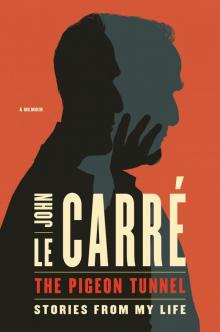 The Pigeon Tunnel: Stories From My Life
The Pigeon Tunnel: Stories From My Life Single & Single
Single & Single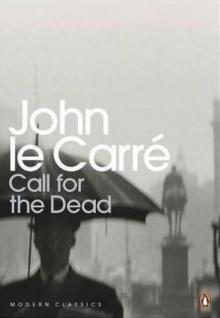 The Spy Who Came in From the Cold
The Spy Who Came in From the Cold The Looking Glass War
The Looking Glass War The Night Manager
The Night Manager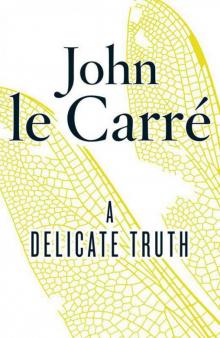 A Delicate Truth
A Delicate Truth A Perfect Spy
A Perfect Spy The Little Drummer Girl
The Little Drummer Girl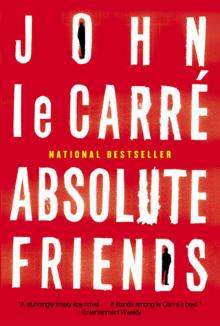 Absolute Friends
Absolute Friends A Murder of Quality AND Call for the Dead
A Murder of Quality AND Call for the Dead The Russia House
The Russia House The Tailor of Panama
The Tailor of Panama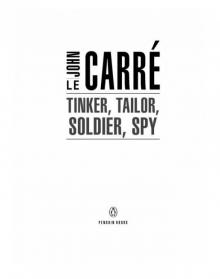 Tinker, Tailor, Soldier, Spy
Tinker, Tailor, Soldier, Spy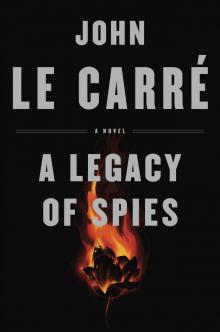 A Legacy of Spies
A Legacy of Spies The Mission Song
The Mission Song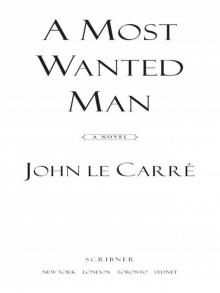 A Most Wanted Man
A Most Wanted Man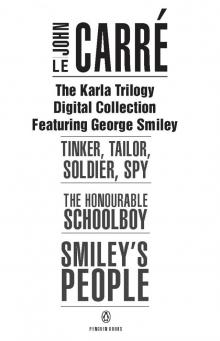 John Le Carré: Three Complete Novels
John Le Carré: Three Complete Novels The Secret Pilgrim
The Secret Pilgrim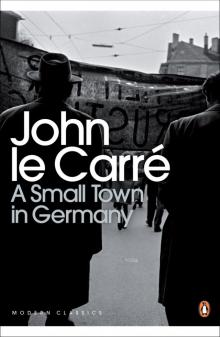 A Small Town in Germany
A Small Town in Germany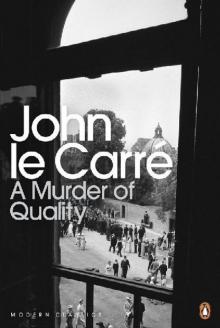 A Murder of Quality
A Murder of Quality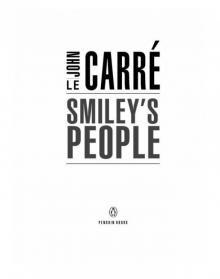 Smiley's People
Smiley's People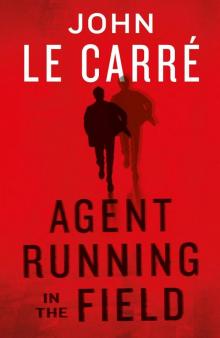 Agent Running in the Field
Agent Running in the Field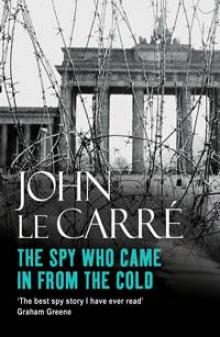 The Spy Who Came in from the Cold s-3
The Spy Who Came in from the Cold s-3 The Pigeon Tunnel
The Pigeon Tunnel The Russia House - 13
The Russia House - 13 The Honourable Schoolboy
The Honourable Schoolboy Call For The Dead s-1
Call For The Dead s-1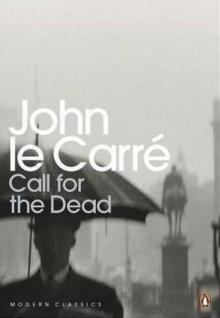 Call for the Dead
Call for the Dead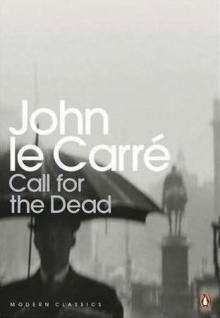 Call for the Dead - 1
Call for the Dead - 1